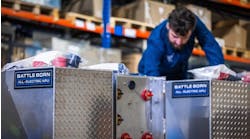U.S. and Canadian trucking lobby groups are pushing state and provincial governments to offer fuel tax discounts to spur wider adoption of auxiliary power units (APUs) on Class 8 rigs – to both reduce fuel consumption and cut pollution levels generated by long-haul operations.
“The use of idling reduction technology could reduce the fuel consumption of a long-haul tractor by some 1,900 gallons or 7,200 liters per year, which equates to an emissions reduction of greenhouse gases of some 42,000 lbs or 19 metric tons,” said David Bradley, CEO of the Canadian Trucking Alliance (CTA). “The tax system has a role to play in accelerating the use of this emission-saving technology.”
“Coupled with operational savings, this is a significant incentive for installing an APU,” stated Gov. Bill Graves, president & CEO of the American Trucking Associations (ATA). “Governments have a role in regulating emission reductions in trucking … but the public sector must also recognize its role in providing the business community with incentives to further reduce these emissions.”
To help spur APU adoption, both ATA and CTA want the International Fuel Tax Association Inc. (IFTA) member jurisdictions to stop taxing fuel used to operate APUs. IFTA is the organization through which motor carriers’ fuel use tax obligations are administered uniformly throughout North America.
One reason those trucking groups want more tax support for APUs revolves around their price tag – which ranges anywhere from $6,000 to $10,000 in the U.S., with an average of $7,750, including installation costs, plus the cost of operation.
Fuel consumption rates vary, according to ATA’s research, but over-the-road operators should expect APUs to consume 500 gallons or 1,900 liters a year. At the average state fuel tax rate of about 22 cents per gallon and provincial rate of 15 cents a liter, an exemption would represent a tax savings of more than $100 in the U.S. annually, which equates to $280 Canadian.
APUs can also help fleets on the driver-fatigue front as well, explained Will Watson vp-sales and marketing for Sparks, NV-based Auxiliary Power Dynamics.
“As more jurisdictions approve anti-idling measures in an effort to reduce air pollution, and as diesel prices continue to climb, many trucking companies believe they have little choice but to equip their trucks with devices that restrict engine idling,” he said.
“The right APU offers heating and cooling similar to the truck’s heating, air conditioning and ventilation system,” Watson added. “That means drivers get more comfortable, restful sleep and start their shifts ready for the rigors and demands of driving trucks.”

